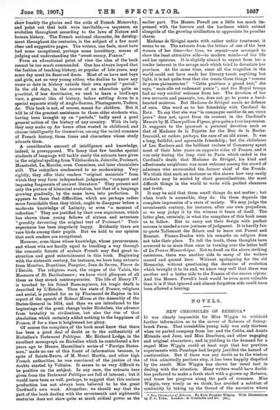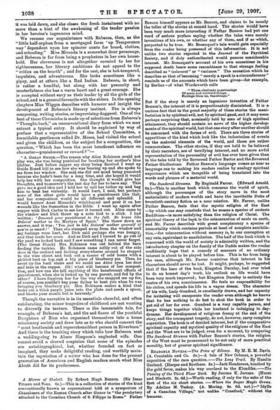NOVELS.
NEW CHRONICLES. OF REBECCA" IT was clearly impossible for Miss Wiggin to withhold further information as to the career of Rebecca of Sunny. brook Farm. That irresistible young lady was only thirteen when we parted company from her and the Cobbs, and Aunts Miranda and Jane, and Miss Dearborn, and other engaging and original characters; and in yielding to the demand for a sequel Miss Wiggin could at least urge that her previous experiments with Penelope had largely justified the hazard of continuation. But if there was any doubt as to the wisdom of this admittedly perilous step, it has been happily dispelled by the result. Miss Wiggin has shown her usual tact in dealing with the situation. Many writers would have doubt- less preferred to make a fresh start with a grown-up Rebecca, and trace her progress along the path of romance. Miss Wiggin, very_ wisely as we think, has avoided a solution of continuity, by taking up the thread of the narrative where • • Rao ClerOaicles of Rebecca. By Kate Douglas Wiggle, With Illustrations by F. 1.7. Taira, Loudon & Coustable arid Co. [Os.]
it was laid down, and she cloves the fresh inetalment with no more than a hint of the awakening of the tender passion in her heroine's ingenuous mind.
We resume our acquaintance with Rebecca, then, as the "little half-orphan from a mortgaged farm 'up Temperance way' dependent upon her spinster aunts for board, clothes, and schooling." Miss Miranda is a somewhat dour personage, and Rebecca 111 fax from being a prophetess in her own house- hold. Her cleverness is not altogether counted to her for righteousness, her literary ambitions do not appeal to the "critics on the hearth" ; and for the rest, she is hot-tempered, impulsive, and adventurous. She looks sometimes like a gipsy, and at others like a Red Indian. Rebecca, in short, is rather a handful, but along with her precocity and masterfulness she has a warm heart and a great courage. She is accepted without envy as their leader by all the girls of the school, and is a. generalfavourite with the elders. In the opening chapters Miss Wiggm describes with humour and insight the development of Rebecca's literary instinct. She is always composing, writing stories, or improvising doggerel. One of the best of these Chronicles is made up of selections from Rebecca's "Thought-book," an unconventional diary from which we may extract a typical entry. It should be explained by way of preface that a representative of the School committee, a formidable gentleman called Dr. Moses, had visited the school and given the children, as the subject for a composition, the question, "Which has been the most beneficent influence on character—punishment or reward P "— "A GREAT Snoca..—The reason why Alice Robinson could not play was, she was being punished for breaking her mother's blue platter. Just before supper my story being finished I went up Guide Board hill to see how she was bearing up and she spoke to me from her window. She said she did not mind beiog punished because she hadn't been for a long time, and be hoped it would help her with her composition. She thought it would give her thoughts, and to-morrow's the last day for her to have any. This gave me a good idea and I told her to call her father up and beg him to beat her violently. It would hurt, I said, but perhaps none of the other girls would have a punishment like that, and her composition would be all different and splendid. I would borrow Aunt Miranda's witchhayzel and pour it on her wounds like the Sumaritan in the Bible. I went up again after supper with Hick Carter to see how it turned out. Alice came to the window and Dick threw up a note tied to a stick. I had written: 'Demand your punishment to the full. Be brave like Dolores' mother in the Martyrs of Spain.' She threw down an answer, and it was You just be like Dolores' mother yourself if you're so smart ! ' Then she stamped away from the window and any feelings were hurt, but Dick said perhaps she was hungry, and that made her cross. And as Dick and I turned to go out of the yard we looked back and I saw something I can never forget. (The Great Shook) Mrs. Robinson was out behind the barn feeding the turkies. Mr. Robinson came softly out of the side door in the orcherd and looking everywheres around he stepped to the wire closet and took out a saucer of cold beans with a pickled beet on top, and a big piece of blueberry pie. Then he crept vp the back stairs and we could see Alice open her door and take in the supper. Oh! what will become of her composi- tion, and how can she tell anything of the beneforcent effects of punishment, when she is locked up by one parent, and fed by the ether? I have forgiven her for the way she snapped me up for, of course, you couldn't beg your father to beat you when he was bringing you blueberry pie. Mrs. Robinson makes a kind that leaks out a thick purple juice into the plate and needs a spoon, and blacks your month but is heavenly."
Though the narrative is in its essentials cheerful, and often exhilarating, the minor tragedies of childhood are not wanting to diversify its texture. There is the lamentable tale, for example, of Rebecca's hat, and the sad fiasco of the youthful Daughters of Zion who organised themselves into a home missionary society and drew lots as to who should convert the "most heathenish and reperrehensiblest person in Riverboro." And there is the touching story which tells bow Rebecca sent a wedding-ring to Abner Simpson's neglected wife. One "cannot avoid a shrewd suspicion that some of the episodes are autobiographical, but, whether founded on fact or imagined, they make delightful reading, and worthily main- tain the reputation of a writer who has done for the present generation of American and English readers much what Miss 'Alcott did for its predecessor.

















































 Previous page
Previous page